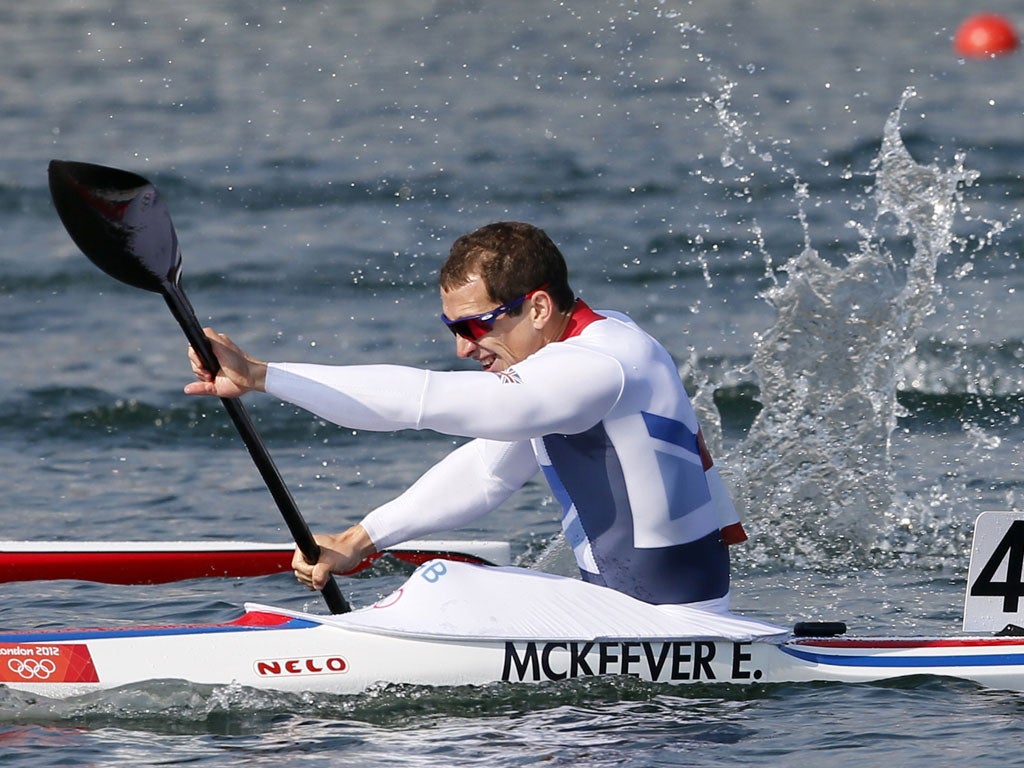Canoeing: Ed 'The Cleaver' McKeever cuts up field like Usain Bolt
Ed McKeever is quickly labelled the Usain Bolt of sprint canoeing after powering away and holding lead to win gold

Ed McKeever is not the most expressive of British gold medallists and not ready to declare himself a legend, though it was a small step towards self aggrandisement yesterday when, having burned his way to canoe sprint gold, he was willing to accept comparisons with Usain Bolt. He had been non-committal about that before his race, pointing out that "he's tall and I'm short".
The 28-year-old trainee accountant is not about to become seared across the national sporting psyche, even though Matthew Pinsent proclaimed him as Ed 'the Cleaver' McKeever early yesterday when foretelling that he would take the field apart. A holiday "by the seaside" is McKeever's rather quaint immediate ambition, after completing several tasks he signed up to in readiness for his own wedding in Beaconsfield, Buckinghamshire, next month. He's organising the suit fittings and the transport, though he took the idea that canoes might feature rather literally. "The wedding's quite a long way from a river so that won't work…" There is no time to develop a feel for irony, for a good anecdote – or indeed for anything – when you're embarking on a pursuit of Olympic gold in the way that McKeever has. He first scented his opportunity four years ago when Olympic canoeing organisers decided to bring in the 200m canoe sprint in an attempt to introduce some different names to the podiums of a sport dominated by Tim Brabants, Adam van Koeverden and Eirik Larssen. McKeever could not make the Olympic team when 500m was the shortest event but this discipline was made for him. "I've always been a powerful, speedy athlete," McKeever reflected after winning his gold. "I was quite a good 500m paddler but obviously not an Olympic champion. I got away ahead but didn't always maintain it over longer distances."
It is McKeever's trademark to power ahead, with a giant first stroke unlike anything else known in one-man or two-man canoe sprinting. He often keeps that lead, demonstrating in those vital early seconds why physiologically he is "like a block of granite", as the canoe sprint head coach Brendan Purcell put it after the race. "When he is on that line and he puts down that first stroke, all that force is transferred into forward motion," Purcell added. "Most others will have a loss in the kinetic motion but Ed is little bit unique. He just holds himself in the position, locks himself and moves the boat. Everyone else uses a shorter smaller stroke."
The fractional hope for McKeever's competitors came at what is known in the sprint pursuit as the "second start" – between 25m and 100m – where that strong launch needs to be built into acceleration. Briefly, his challengers were quite close, but then he eased away again. "It was from 50m to 100m that he really put it down," Purcell said. "Once he got to 50m to go I thought it was in the bag."
McKeever's decision to wear an aerodynamic top adapted from those used by the British cyclists in these Olympics provides a revealing glimpse into the way the two elite sports have been sharing knowledge to gain the "marginal advantages" which Dave Brailsford, the British Cycling performance director never tires of talking about. Jon Schofield, who with Liam Heath took bronze yesterday in the two-man 200m sprint, revealed how the canoeists have also shared the benefit of Steve Peters, GB Cycling's silver-haired psychiatrist, but the two sports also share an obvious requirement to generate optimum force. In the 1,000m canoe sprint, the blade is in the water for 0.4 seconds and in the 200m for an even shorter period of time. McKeever has experimented with different paddles and looked closely at different aerodynamic advantages.
The sheer drive to win also took this rather awkward individual right up into Bolt's realm. "It was a little bit frustrating, watching everyone else go and win their medals while we were sitting in our hotel rooms watching," the champion reflected.
His explanation of how he was up at 5.30am "like a kid at Christmas… waiting to get my present" was not boastful, just factual. Purcell nodded, knowingly. "Olympic champions are champions for a reason," he said. "They have the whole package."
Having surpassed the medal target they set themselves and hit their more ambitious UK Sport "stretch target" the canoeists' successful Olympics has left them believing that they can become a force in the same way the cyclists have – despite competition from new places.
The Australian men's kayak four ended the European stranglehold with their gold, becoming only the first non- Europeans to win something at a Games where a boycott had not limited the field. The British, like the Germans and Hungarians, will not be getting their own way in Rio.
Head to head: McKeever vs Bolt
Ed McKeever
Age: 28
Height: 5ft 8in
Weight: 12st 6lb
200m time at this Olympics: 36.246sec
Number of strokes in 200m: 110
Average number of strokes per second: 3
Usain Bolt
Age: 25
Height: 6ft 5in
Weight: 14st
200m time at this Olympics: 19.32sec
Number of steps in 200m: 83
Average number of steps per second: 4
Subscribe to Independent Premium to bookmark this article
Want to bookmark your favourite articles and stories to read or reference later? Start your Independent Premium subscription today.

Join our commenting forum
Join thought-provoking conversations, follow other Independent readers and see their replies